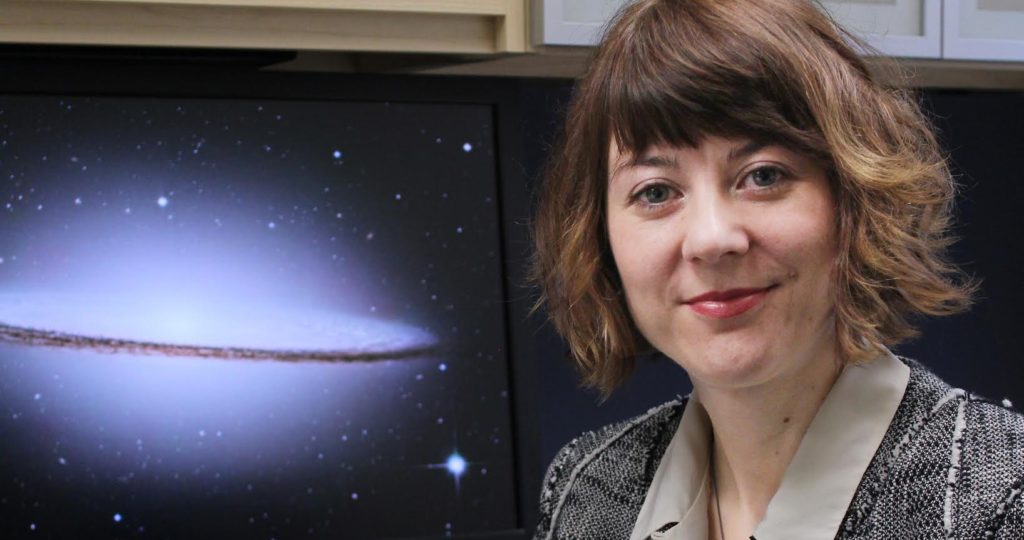Podcast: Play in new window | Download
Subscribe: Apple Podcasts | RSS
Dr. Tamara Bogdanović is an Assistant Professor in the Georgia Institute of Technology School of Physics, as well as a member of the Center for Relativistic Astrophysics . She received her B.Sc. in Astrophysics from the University of Belgrade in Serbia and her Ph.D. in Astrophysics from Pennsylvania State University. Tamara conducted postdoctoral research at the University of Maryland, where she received a NASA sponsored Einstein Postdoctoral Fellowship as well as an Astronomy Prize Theory Postdoctoral Fellowship. She has also been named an Alfred P. Sloan Research Fellow, a Cottrell Scholar, and a Cullen-Peck Fellow in recognition of her research and teaching. Tamara is with us today to share stories from her life and science.
People Behind the Science Podcast Show Notes
Life Outside of Science (2:07)
Free time for Tamara is spent outdoors hiking in the woods or strolling around the neighborhood with her husband. She also likes participating in group yoga classes and immersing herself in different worlds through reading.
The Scientific Side (4:07)
Tamara is a theoretical physicist who studies some of the largest black holes in our universe, known as supermassive black holes. She investigates observational signatures associated with the interactions these supermassive black holes have with gas and stars. Her group works to develop theoretical models to predict signatures of supermassive black hole interactions that can potentially be identified in observational astronomical data.
A Dose of Motivation (5:21)
“A true Jedi uses the Force for knowledge and defense, never for attack.” -Yoda from Star Wars
What Got You Hooked on Science? (6:43)
Growing up in a small town in Serbia, Tamara had a wide variety of early career aspirations, spanning from ballerina to architect. She recognized early on that she enjoyed solving challenging problems, but it wasn’t until high school that she became aware of astrophysics as a potential career field. Astrophysics was appealing because it incorporated challenging problems, the adventure of discovery, and many of the elements she enjoyed about math and physics. Though there were points where others questioned her career choice, but Tamara’s family was very supportive, and she knew this was the kind of work she wanted to do.
The Low Points: Failures and Challenges (17:02)
When Tamara started applying for faculty positions in a variety of countries, the astronomy job market was grim. The onset of the global economic crisis resulted in many institutions initiating a faculty hiring freeze, which meant the few highly competitive positions in her small field became even more competitive. She was also faced with trying to find a place where she and her husband (also a scientist) could both find jobs, the need to maintain employment to be allowed to stay in the country, and that nagging voice of her high school teacher telling her she should have pursued engineering instead.
A Shining Success! (20:43)
A very important component of an early faculty member’s job is to assemble a laboratory and a team of students, postdocs, and/or staff members who can quickly get up to speed and start making important contributions to the field. About a year or two ago, Tamara’s research group reached this threshold, and they have begun making important contributions to various research topics. This was really rewarding, and it was also exciting to have her research efforts recognized this year through receipt of the Cottrell Scholar Award and Cullen Peck Fellowship.
Book Recommendations (2:44)
The Autobiography of Mark Twain edited By Harriet E. Smith, et. al
Most Treasured Travel (24:09)
In 2010, Tamara traveled with her now-husband to the Meeting of the American Astronomical Society in Hawaii. Tamara enjoyed presenting her research and re-connecting with colleagues. In addition, she and her fiancé decided a week before the conference to get married in Hawaii while they were there, and they had a beautiful small ceremony on the beach. After this trip, they traveled to different cities to celebrate the momentous occasion with friends and family all over the world.
Quirky Traditions and Funny Memories (28:03)
A group of astrophysics faculty members at Georgia Tech started a tradition of holding a series called “Faculty on the Hot Seat” where faculty members candidly answer questions from students, postdocs, and other faculty in the audience. The questions can be about their research or their lives in general. It is a fun and funny way to get to know each other and show students a different side of their teachers and mentors.
Advice For Us All (32:12)
Always look on the bright side of life. There will inevitably be times when things don’t go your way. With a lot of patience, belief in yourself, and a pinch of luck, you can make it through anything.
Guest Bio
Tamara Bogdanović is a theoretical astrophysicist whose research interests include the ins and outs of some of the most massive black holes in the universe known as supermassive black holes. She investigates the physical processes that arise in accretion flows around supermassive black holes and uses them as luminous tracers of these otherwise dark objects. Some of the scenarios she and her colleagues study include the accretion of gas by the single and binary supermassive black holes as well as the accretion of stars that happen to be disrupted by the black hole tides in galactic nuclei. Tamara’s goal as a theorist is to predict the signatures of these interactions which can be searched for in observations, as well as to provide interpretation for some of the puzzling astrophysical events seen on the sky.

Leave a Reply